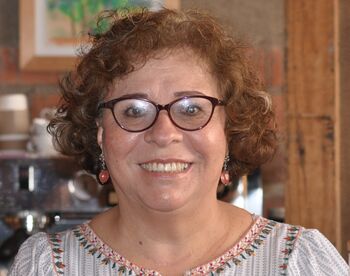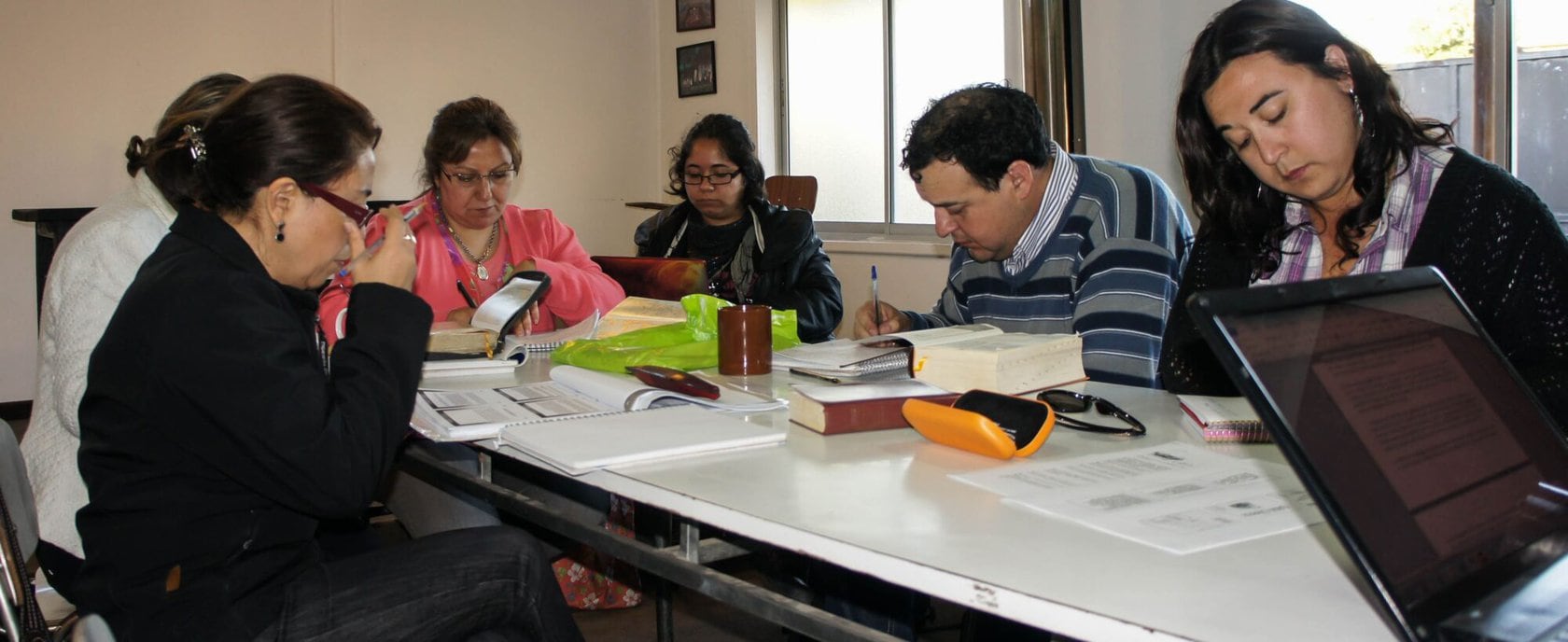
Jannet Villanueva
Coordinator Latin America (Bolivia and Peru)

Project Number: 400.1020
Latin America is becoming increasingly pluralistic in religious terms. At the same time, politico-religious fundamentalism, which undermines democracy and the rule of law, is growing at an alarming rate. These conservative religious groups are well anchored in the political party system of various nation states and are in close dialog with the conservative media and economic and political elites. They often spread messages that are politically and culturally strongly opposed to any progress on human rights for women and the LGBTIQ population, as well as social initiatives that advocate for social and environmental justice (more regulation and reparations for harm) and call for immediate action on climate change. Against this backdrop, education and training in the theological field has become increasingly important. In an increasingly hostile climate of exclusion and intolerance, Mission 21's theological partner organizations are committed to the social inclusion of dissenters and ethnic and social minorities and to the urgent need for action on environmental justice through their various educational offerings. With their reflective and differentiating approach to theology and religion, UBL, DEI, CTE, AETE and SASP are qualified to work on the issue of increasing fundamentalism throughout Latin America and to advocate for diversity and justice in society and the church. Studying at UBL, DEI, CTE, AETE or SASP offers many young people the opportunity to deepen their theological knowledge and critically engage with theological and social issues. While the academic courses offered by our partners are aimed at those interested in obtaining a formal degree, low-threshold educational courses are aimed at a broad spectrum of Latin American social and church-based grassroots movements. The aim of these courses is to educate and train leaders who are active in the areas of the environment, human rights and gender justice and to network them with one another.
The Latin American Bible University (UBL) is a theological university in San José, Costa Rica. In its educational work, UBL promotes awareness of gender justice, environmental issues and alternative economic models that are oriented towards a "good life" for all. Its principles are ecumenical openness, holistic spirituality, commitment to peace and a special sensitivity towards the ethnic diversity of Latin America. Committed to contextual theology, the UBL decided two years ago to make "planetary life" a new key aspect of teaching, research and community life. To this end, UBL was certified as a Green Seminary in 2020. UBL's educational offer is open to everyone and is aimed at people throughout Latin America. The Documentary film on the occasion of the 100th anniversary in 2023 provides an insight into the liberation theology profile of the institution, which is committed to justice.
The Evangelical Theological Community in Chile (CTE) which is sponsored by eight churches, is the only Protestant training center in Chile to offer theological education and training at an academic level. This is primarily aimed at people from the various Protestant churches in Chile and is holistic and open to the diversity of Christian traditions.
In the various training programs, the CTE prepares participants for their future work in church and society and places particular emphasis on a socially critical educational program that advocates social inclusion of dissenters and minorities and counteracts a fundamentalist reading of the Bible that, among other things, cements stereotypical gender roles and seeks to promote anti-democratic state and social structures.
The "Asociación Educativa Teológica Evangélica" (AETE) is a training center for evangelical-ecumenical theology in Peru. It trains full-time pastors as well as volunteers and religiously interested people for church and social commitment. Among other things, the ability to initiate processes of change in the respective environment is imparted. AETE was first founded by Protestant churches from the ecumenical environment as a Peruvian branch of the Latin American Bible University UBL in Costa Rica. Since 2012, it has been functioning independently of UBL.
The theological institute "Seminario Andino San Pablo" (SASP) offers basic theological training as well as university theological training. The university training is aimed at future pastors and takes place in collaboration with the Universidad Biblica Latinoamericana (UBL) in Costa Rica. SASP is based in the city of Huancayo in the Peruvian Central Andes. One of the main focuses of the SASP is the promotion of women and intercultural dialogue. To this end, the Institute conducts theology courses in communities in the nearby rainforest, as well as in the Central (Cerro de Pasco and Huanuco) and Southern Andes (Puno, Apurimac).
The Ecumenical Training Center "Departamento Ecuménico de Investigaciones" (DEI) in San José, Costa Rica, works in the fields of education and supporting human rights defenders. The starting point is the conviction that theology must be in exchange with other fields of knowledge. The seminars deal with interdisciplinary issues from theology, economics, environmental and social sciences. The DEI draws its inspiration from Latin American liberation theologies and is committed to the protection of human rights defenders.
The partners UBL, DEI, CTE, AETE, SASP contribute to the 2030 Agenda with their activities in the field of education for social change. In particular, the partners are working on the inclusion of socially marginalized and vulnerable population groups (SDGs 10.2 and 16.7). Participants in theological education programs acquire an ecumenical foundation that allows them to critically examine issues of faith, society and their relationship to the environment. This should enable them to work for justice, peace, the integrity of creation and diversity after graduation.
The educational opportunities offered by our partners UBL, DEI, CTE, AETE and SASP are open to anyone interested in a theological education or training program.
Target group academic education programs
The academic study programs of UBL, CTE, AETE and SASP are aimed at pastors and church leaders. In addition, there are lay people and leaders of church organizations as well as professionals interested in theology or Christian religious education. Through the students, the educational work benefits the various churches in a large number of Latin American countries. In order to expand the circle of potential theology students, our partners have expanded their existing virtual study program during the pandemic, so that even more students are participating in the training programs than before the pandemic.
Target group low-threshold educational offers
All partners also offer low-threshold educational programs and courses. These are aimed at socially committed members of communities and Latin American social and church movements, theologians and animators. This also includes particularly vulnerable population groups such as women, young people, indigenous people and African-Americans. These people only have limited access to educational opportunities. They experience discrimination and exclusion due to poverty, their commitment to the environment and human rights, their ethnic and social characteristics or their sexual orientation. The courses strengthen their ability to participate in church and society and promote a self-determined life.
Activities academic educational program
The partners UBL, CTE, AETE and SASP offer various training courses that can be completed with a diploma, the "Bachillerato", the licentiate or even a master's degree. All educational institutions teach contextual liberation theology (see box Partner organizations). The UBL offers comprehensive virtual theology studies with a state-recognized degree (licentiate in biblical studies or theology) for students from all over Latin America. It is possible to specialize with a Master's degree in Religion, Gender and Diversity or in Theology and Interculturality in collaboration with the National University UNA.
The CTE also offers a comprehensive virtual and hybrid theology degree program in Santiago and Concepción. Thanks to an agreement with the Pontificia Universidad de Valparaiso, students can obtain a state-recognized licentiate.
At AETE, Mission 21 promotes basic studies in Bible and theology, which also includes modules at DEI and the Martin Luther King Center in Cuba. This cooperation broadens the participants' horizons and gives them the opportunity to learn different methods of critical Bible interpretation.
The SASP is closely linked to the UBL and provides students with a foundation course in Bible and theology. The SASP pays particular attention to the educational placement and support of students, as they often come from very conservative churches. Thanks to an agreement with the UBL, particularly interested students can continue their studies and obtain a state-recognized degree.
During their academic training with our partner organizations, students generally undergo a process of transformation. This manifests itself in students questioning their previous, often conservative, theological views and discovering theology in its social context. The educational institutions enable their students to deal with taboo topics in church and theological training circles, such as gender justice, sexuality, feminism and the latent and painful reality of violence against women.
Activities Low-threshold educational offers
Among the low-threshold educational offers, Mission 21 supports the socio-theological workshop at DEI, for example. This offers participants the opportunity to analyze mechanisms of violence, discrimination and exploitation of people and the environment in Latin America and to derive impulses for their own commitment. The workshop also increasingly focuses on mental health and self-care. Getting involved in an environment of violence or political repression saps your strength and pushes people to their limits.
At AETE, Mission 21 is now supporting courses on violence prevention in local conservative parishes in the north and south of Lima, Chiclayo and Cajamarca. To this end, AETE deliberately chooses workshop leaders who are familiar with the religious and church context and are respected by pastors. AETE thus makes an important contribution to the prevention and removal of taboos surrounding violence against women in churches and, if necessary, also arranges professional help for those affected by violence.

Project budget 2024
CHF 195,000
Mission 21
Protestant Mission Basel
PO Box 270
Missionsstrasse 21
4009 Basel, Switzerland
Tel.: +41 (0)61 260 21 20
info@mission-21.org
Donation account Switzerland:
IBAN: CH58 0900 0000 4072 6233 2
Tax exemption number:
CHE-105.706.527
Donation account Germany:
Savings Bank Lörrach-Rheinfelden
Swift BIC: SKLODE66
BLZ: 683 500 48
IBAN: DE39 6835 0048 0001 0323 33
Account No. : 1032333